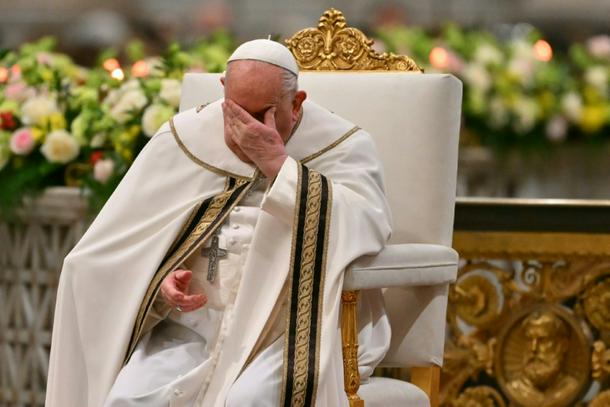
Pope Francis has suffered increasing health issues in recent years
Rome (AFP) - Pope Francis did some work during his fourth day in hospital Monday, but the 88-year-old faces a “complex clinical picture” that will require a longer than expected stay, the Vatican said.
The head of the Catholic Church was admitted to Rome’s Gemelli hospital on Friday with bronchitis, the latest of a series of health issues in recent years.
In a statement earlier Monday, the Vatican said tests had confirmed “a polymicrobial infection of the respiratory tract that has led to a further change in treatment”.
“All the tests carried out until now are indicative of a complex clinical picture that will require adequate hospitalisation,” it said.
In an early evening update, it said his clinical condition was unchanged, he continued to be fever-free and was continuing the unspecified treatment.
“This morning he received the Eucharist and subsequently dedicated himself to some work and reading texts,” the update said.
“Pope Francis is touched by the numerous messages of affection and closeness he continues to receive,” it added.
After initially cancelling events through Monday, the Vatican said the pope’s weekly Wednesday audience would not go ahead either.
Vatican spokesman Matteo Bruni had earlier told reporters that the pope was in “good humour”, had rested well overnight, had eaten breakfast and read the newspapers.
A source in the pope’s entourage had also insisted there was no alarm within the Vatican.
Francis was admitted after a “very busy” two weeks, during which “he was weakened”, the source told AFP, but added: “There is no alarmism.”
A Vatican source told AFP the pope was receiving oxygen.
Yet the news of the more complex situation raises fresh concerns about the Argentine pontiff, who has suffered increasing health issues in recent years.
- Difficulty breathing -
In the days before his admission, Francis had admitted to difficulty breathing and had asked aides several times to read his speeches aloud on his behalf.
At his weekly general audience last Wednesday, he said he “cannot yet” read his own speeches, adding with a smile: “I hope that next time I can.”
But he had continued taking meetings, including one with the prime minister of Slovakia on Friday morning, shortly before he headed to hospital.
Francis had part of one of his lungs removed as a young man and has been particularly susceptible to respiratory infections.
He pulled out of a Good Friday event last year after catching what the Vatican called a “light flu”, but went on to lead Easter services as planned.
A year earlier, in March 2023, Francis was admitted to hospital for three nights with bronchitis, which was cured with antibiotics.
The pope also underwent a hernia operation in June 2023 and in 2021 underwent surgery for a type of diverticulitis, an inflammation of pockets that develop in the lining of the intestine.
He has been using a wheelchair since 2022 because of persistent knee pain and uses a cane during rare moments standing up.
Francis has also fallen a couple of times in the past few months, bruising his forearm in January and sporting a large bruise on his right jaw in December, caused by toppling from his bed.
- ‘Distant possibility’ -
Yet despite his health troubles, Francis remains an active pontiff.
In September 2024, he completed a four-nation Asia-Pacific tour, the longest of his papacy by duration and distance.
And he has a packed schedule, from daily private audiences to the weekly Angelus prayer on a Sunday, and the Wednesday public audience.
He followed Sunday’s mass this week on television from hospital and sent a written address for the Angelus.
“I would have liked to be among you but, as you know, I am here at the Gemelli Hospital because I still need some treatment for my bronchitis,” Francis wrote.
The Jesuit has left open the option of resigning, like his predecessor Benedict XVI, if he became unable to carry out his duties.
But in a memoir published last year, the pope wrote that he did “not have any cause serious enough to make me think of resigning”.
Resignation is a “distant possibility” that would be justified only in the event of “a serious physical impediment”, he wrote.